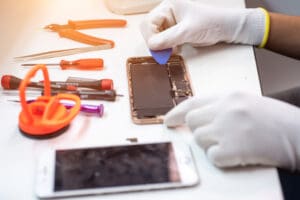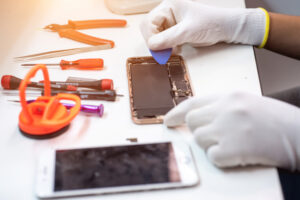
A firm that fixes smartphones is calling for an official device repair apprenticeship to be introduced.
In 2022 there were almost 72 million mobile phone connections in use in the UK.
But repair firm TMT First, which introduced its own apprenticeship after struggling to find staff, points out there is no industry training standard.
By contrast, there are 33 million cars on the road – and mechanics learning on nationally recognised apprenticeships
“There’s lots of young techy people out there who perhaps have even tinkered around with phones at home themselves, and are really interested in how they can do this better, and maybe create a career out of it,” Adam Whitehouse from TMT First said.
“If you think about the technology and all the devices in our homes today, those things need repairing. And when people are taught the correct way of doing that, these devices will last for longer.”
He founded TMT First, based in Newcastle-under-Lyme, Staffordshire, in 2006. He says 58 members of staff have come through his firm’s training courses so far and the company now offers its own apprenticeship.
One of them, Daliana Bianca, said people stop her in the street when she is out at lunchtime wearing the company logo on her clothes to ask for repair help.
But there are no search results under “phone repair” on the website for the Institute for Apprenticeships and Technical Education, a government agency.
The institute’s deputy director, Nikki Christie, told the BBC there had not been sufficient industry interest.
“We would welcome renewed interest in the development of an apprenticeship for this occupation, as it has the potential to be a great entry point into digital careers,” she said.
Mr Whitehouse said his was one of a group of organisations that had submitted a proposal before the pandemic, but several of them were no longer in business.
The Department for Education said the government planned to make £2.7bn available by 2025 for businesses across all sectors to set up their own relevant schemes
Mr Whitehouse’s company, housed in a former British Gas call centre, receives around 10,000 smartphones every month from Samsung, with whom it has a contract, as well as other sources.
His premises consist of warehouse-sized rooms filled with large boxes full of broken devices and row after row of neat drawers containing spare parts of various sizes.
Phones that cannot be fixed get shredded, so that the precious metals inside, including gold, can be retrieved and reused. TMT First has also pioneered a new way of fixing some handsets which reduces e-waste by saving the battery and outside frame.
An experienced technician can carry out 15 to 20 repairs per shift, depending on what the damage is. Smashed screens are still the most common issue.
“We see devices come in that look like they’ve been run over by a car,” said Mr Waterhouse.
“And when we go back and say ‘how did this happen?’, there are times when they actually have been run over by a car.”
Read more:
Calls for UK phone repair apprenticeship to be introduced after specialists struggle to find staff

